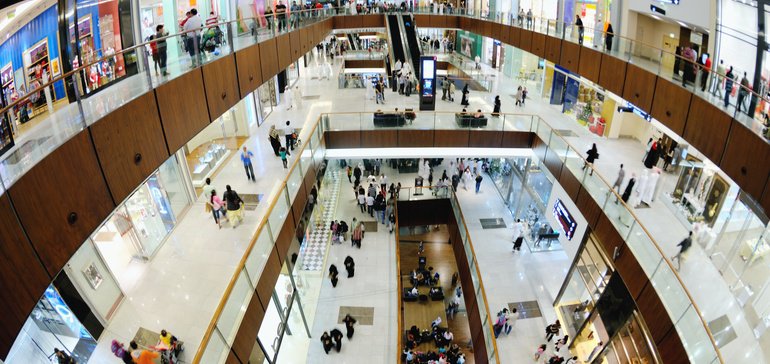Dive Brief:
- Simon Property Group on Thursday said occupancy in its U.S. malls and premium outlet properties was 95.6% at the end of its first quarter, unchanged from the same point last year, according to the company’s first quarter earnings press release.
- Base minimum rent per square foot in those properties rose 4.4% to $51.87, which chairman/ CEO David Simon said reflects “strong retailer demand and pricing power for our locations,” while leasing spread for the trailing 12-months rose 13% to $8.31 per square foot. Reported retailer sales per square foot for the malls and outlets rose 30 basis points to $615, compared to $613 per foot in the prior year period.
- The company’s share of Q1 operating losses from its joint acquisition of apparel retailer Aeropostale was 3 cents per share. Most of the stores and their merchandise have been revamped, and Simon told analysts on a conference call Thursday that the company is “not afraid to invest in it” to help it succeed, according to a transcript from Seeking Alpha.
Dive Insight:
Stores that are faltering these days need to do more than lament pressures from e-commerce, Simon told analysts Thursday, adding that malls must do their part too. “I’m hopeful that they’re going to reinvest in their stores, improve their inventory mix and service their customer better,” he said. “And, by the way, we’ve got to have the same pressure on us to do that. So, it’s a two-way street. We are up for the challenge. We have the conviction in our business to do that as you know if you go through our properties by and large, they look, they feel great. We’re going to redevelop a lot of opportunities.”
Many retailers have over-invested in boosting e-commerce, neglecting their physical locations in the process, an approach that Simon said must change and is changing. Pure-play e-commerce players are simply not going to survive without some pivot to brick and mortar. ”How they overspent in the internet versus the store fleet continues to be a concern for me,” he said. “But I do think they’re starting, given that the returns in the online between free shipping and free returns is no man’s land form … hopefully, they’ll recognize that they should pivot toward the in-store experience. And I think that’s beginning to happen.”
That includes department stores, which have struggled overall and continue to receive the brunt end of many assessments of retail’s future. In addition to a 1% decline in sales, Moody’s Investors Service, in a report released this week , forecast a 7% to 8% decrease in operating profits for those retailers this year, not even counting struggling Sears. Department stores have been hard hit by shifts in shopping habits, slowing mall traffic and competition from e-commerce and off-price retailers, according to the report.
But Simon said he sees department stores as “a great opportunity” for his mall operations, though the company is being choosy about when it comes to the aid of an ailing retailer. “King of Prussia is a great example, Penney’s announced closing,” he said. “We could have saved that deal, we decided absolutely unequivocally not. We’re going to make that a mixed-use development, won’t be apparel-oriented.”
The rash of store closings are actually an opportunity for the company, executives said, though it’s wary of apparel retail. Department store rivals gain market share when a competitor closes, for example, said Simon COO Richard S. Sokolov. “[T]his retail consolidation is going to benefit us because those sales that are in the market, we’re going to get our share of them,” he said. “[W]e have heard from our department stores that when a store closes in the mall, those shoppers for the most part stay in the mall and those sales do get redistributed among the other department stores that are in the property.”
Plus, Simon noted, e-commerce sales fizzle in areas where a store has closed, an assertion that is backed by research from Moody’s and others. Simon also warned that private equity owners often over-burden retailers with debt, which is adding to many of their woes. “We do think private equity has been more of a detriment … and by the way most of these guys are my buddies, okay,” he said. “But I mean, when you lever up any business, whether it’s the mall business, the retail business, and you can’t invest in your product, then you’ve got a problem. We’ve seen a lot of that.”

